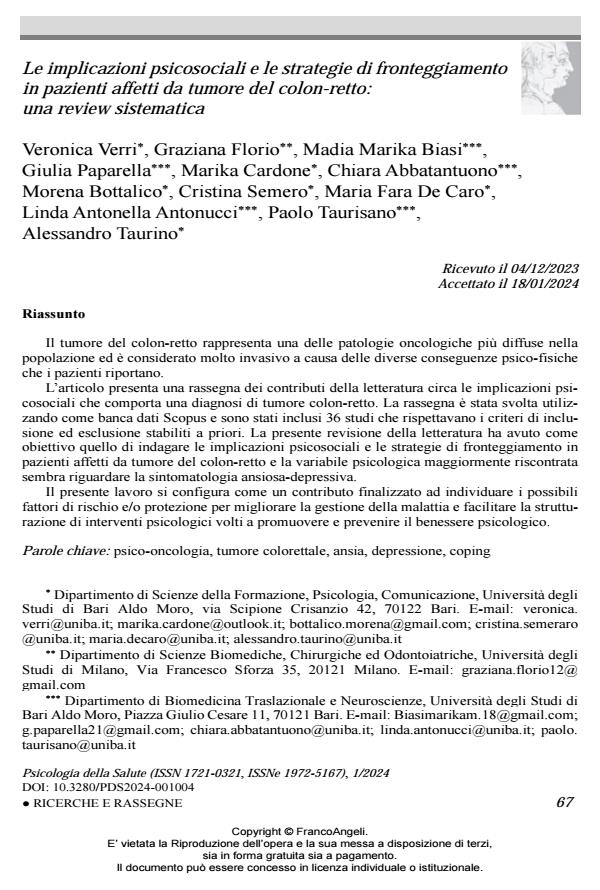Psychosocial implications and coping strategies in patients with colon-rectal cancer: a systematic review
Journal title PSICOLOGIA DELLA SALUTE
Author/s Veronica Verri, Graziana Florio, Madia Marika Biasi, Giulia Paparella, Marika Cardone, Chiara Abbatantuono, Morena Bottalico, Cristina Semero, Maria Fara De Caro, Linda Antonella Antonucci, Paolo Taurisano, Alessandro Taurino
Publishing Year 2024 Issue 2024/1
Language Italian Pages 23 P. 67-89 File size 311 KB
DOI 10.3280/PDS2024-001004
DOI is like a bar code for intellectual property: to have more infomation
click here
Below, you can see the article first page
If you want to buy this article in PDF format, you can do it, following the instructions to buy download credits

FrancoAngeli is member of Publishers International Linking Association, Inc (PILA), a not-for-profit association which run the CrossRef service enabling links to and from online scholarly content.
Colorectal cancer is one of the most common oncological diseases in the population and is considered to be highly invasive due to the various psycho-physical consequences reported by patients. This article presents a review of the literature on the psychosocial implications of be-ing diagnosed with colorectal cancer. The review was conducted using Scopus as a data-base and included 36 studies that met the a priori inclusion and exclusion criteria. The aim of this review was to investigate the psychosocial impact and coping strategies of colorectal cancer patients, and the psychological variable observed appears to be anxie-ty-depressive symptoms. The present work is intended to contribute to the identification of possible risk and/or protective factors in order to improve disease management and facilitate the design of psychological interventions aimed at promoting and preventing psychological well-being.
Keywords: psycho-oncology, colorectal cancer, anxiety, depression, coping
Veronica Verri, Graziana Florio, Madia Marika Biasi, Giulia Paparella, Marika Cardone, Chiara Abbatantuono, Morena Bottalico, Cristina Semero, Maria Fara De Caro, Linda Antonella Antonucci, Paolo Taurisano, Alessandro Taurino, Le implicazioni psicosociali e le strategie di fronteggiamento in pazienti affetti da tumore del colon-retto: una review sistematica in "PSICOLOGIA DELLA SALUTE" 1/2024, pp 67-89, DOI: 10.3280/PDS2024-001004